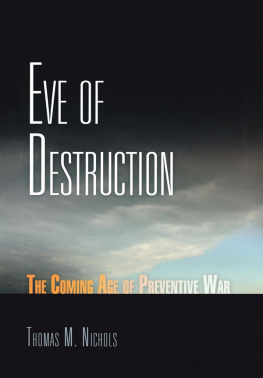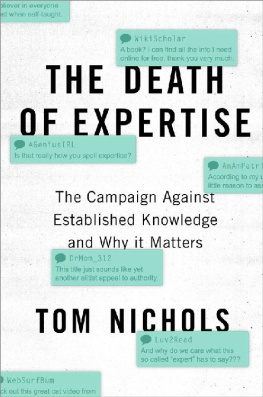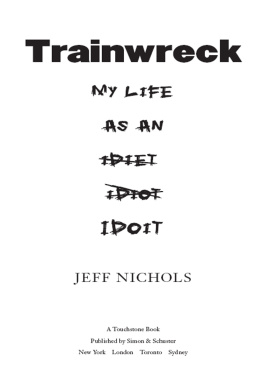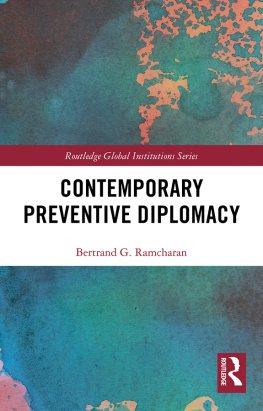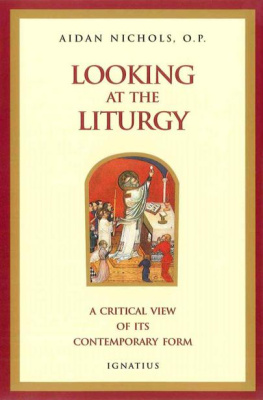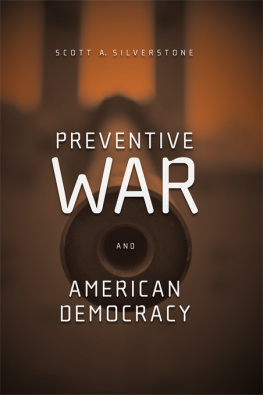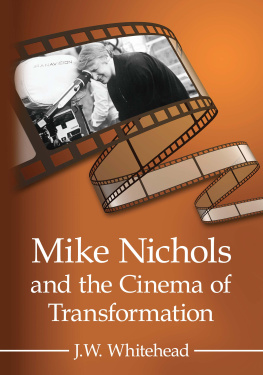Preface
Ive never worked on a project as maddening as Eve of Destruction.
An obvious question, I suppose, is why I chose to look into the problem of preventive war at all. Initially, some readers of earlier work related to this book thought my interest in changing norms about preventive violence must have been spurred by the publication of the U.S. National Security Strategy in 2002, or perhaps by the invasion of Iraq the following year. To be perfectly honest, however, I didnt much consider the National Security Strategy one way or another when it came out, just as I did not pay much attention to any of its predecessors. I assumed only that the White House was now stating explicitly its interest in what had always been an unspoken option. Likewise, since the flawed end of the first Gulf War in 1991, which I had watched from my position at the time as an aide in the U.S. Senate, I had long assumed that sooner or later the United States and Saddam Husseins Iraq were going to settle their unfinished business, one way or another.
Rather, throughout the 1990s, I had an uncomfortable sense, like many other observers, that something in the international system was amiss. Even if the great powers had always believed in acting in their own interest, there was always the tacit agreement that they would at least pretend to honor the idea, enshrined in the Peace of Westphalia in 1648, that states should not interfere in the internal affairs of their neighbors. After the end of the Cold War, as a string of interventions took place from Somalia to Kosovo, the Westphalian deal seemed to be coming apart, even if no one was willing to say so outright.
The more immediate catalyst to my research on preventive war was a string of rather alarming statements that were coming out of Moscow in late 2003, in which the Russians (as I discuss in security officials represented perhaps just some of the usual bluster from Moscow I had read many times before. But the more I looked into events in Russia, the more I found that the Russians were giving a great deal of serious thought to issues of prevention and had been for some time.
More intriguing, I also found that the Russians were hardly alone in their interest in using force in the absence of an immediate threat and, if necessary, without so much as a by-your-leave from the United Nations or anyone else. More research produced more surprises, as I found similar attitudes being voiced in France, Australia, Great Britain, Japan, and elsewhere. As in Russia, these were debates that seemed to have been brewing, if quietly, for some years. Discussions with colleagues in Europe were especially eye-opening; when I said I had a suspicion that a global norm of prevention was on the rise, I was congratulated on discovering the obvious.
Yet, I had little success in getting anyone in the United States, Europe, or Asia to discuss preventive war on the record, even among now-retired policy makers, despite the fact that it is obviously the subject of intense debate around the world. I tried to arrange interviews on the subject, for example, in a major Asian capital, but my informal requests were treated as almost impolite, and answered with chilly refusals. I had somewhat better luck in Europe, but in other cases my requests were deflected to lower-level officials or delegated to civilian defense thinktanks. Surprisingly, the Russians were the most forthcoming, and I gladly express my gratitude to the government of the Russian Federation for being very accommodating in my request for interviews at both the foreign and defense ministries. But even Russian officials were, to put it gently, inconsistent in my discussions with them. This is not to say they were disingenuous: my conversations in Russia were among the most enlightening and interesting I had in my travels. Rather, I had the sense that the Russians, like so many other people, were wrestling with foreign policy and national security problems that are fundamentally unprecedented in their experience.
But this difficulty in getting foreign governments or their defense analysts to speak on the record is not why this project was so maddening. I did not expect that any government, including my own, would send a spokesman to jettison three centuries of international law and custom, abjure reliance on the holy grail of deterrence, and openly advocate for the sin of preventive war.
Rather, what I found most frustrating was the degree to which the entire subject of preventive violence has become so polarizing, to the point where reasoned debate, or simply even discussion of the empirical investigation, is almost impossible.
During the writing of this study, I found that reactions to questions about preventive war tended to vary, as is often the case with controversial issues, according to previously held beliefs. On one side, people who would generally consider themselves liberals were literally enraged by even the mention of the subject, and at times I was accused of researching the problem only so that I could serve as an apologist for nefarious neoconservative schemes in Iraqdespite my obvious misgivings about the Iraqi fiasco. (That I teach in a military institution didnt help matters.) Conservatives, by contrast, noted my objections to the potentially untrammeled and unregulated exercise of American power, and I was reproached for apparently trying to hand the beloved sovereignty of the United States of America over to hostile Third World socialists in the United Nationsdespite my obvious skepticism about the UN. As for the overarching question of whether we are now living in a new age of prevention, those who think of themselves as unilateralists didnt care, and advocates of multilateralism prayed it wasnt so. But few people, it seemed, wanted the question of the preventive taboo raised explicitly, even though it is obviously on the security agenda of a significant number of nations.
And so I wrote Eve of Destruction partly as an empirical investigation into how the world has changed since the end of the Cold War, but also as an attempt to think through the implications of those changes without either carrying the baggage of partisan politics or wandering into the scholastic miasma of increasingly sterile debates between contending schools of international relations theory. (Theory is important. But it should never take on a life of its own, as it so unfortunately has in recent years.) Naturally, the war in Iraq was, as I say in , the elephant in the middle of the room as I undertook this project. But Iraq was not foremost in my mind as I began writing. Rather, I wanted to investigate whether international norms were changing as deeply and rapidly as they seemed to be over the past two decades. The answer, however distressing it may be, became this book.


